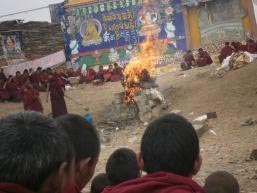
Burning the body of Phuntsog at sky burial site. Monks and lay people surrounded the site and chanted prayers for Phuntsog.
- The burning of books not approved by the authorities following a hunger strike by students in sympathy with the situation of the Ngaba people;
- Further information on the two Tibetans in their sixties who died after beatings by police as they tried to protect Kirti monks from being taken away from the monastery in trucks by paramilitary police;
- The sentencing of two Kirti monks to three years each in the context of a broadening climate of fear prevailing in the area. About 25 Tibetans still remain in detention of the 40 Kirti monks and Ngaba laypeople who were initially detained. There are no details or information about the whereabouts of the 25 still in detention. The 300 monks who were taken away by security forces on the night of April 21 are being held in Ngaba. They have been divided into different groups and are being detained in three separate counties;
- Ngaba people have described the nature of the crackdown and military buildup in the area as comparable to images they see on television of war zones. An exiled Kirti monk said: “Ngaba is under a kind of invisible martial law. Communication networks are closed down, roads are closed, people are prohibited from gathering, normal religious observances are suspended and so forth. The monasteries and schools have turned into prisons, Ngaba people in Beijing, Lanzhou and Chengdu are being detained or restricted, and a broad crackdown imposed on all monasteries in the region.”
Students at Barkham under lockdown; books burned
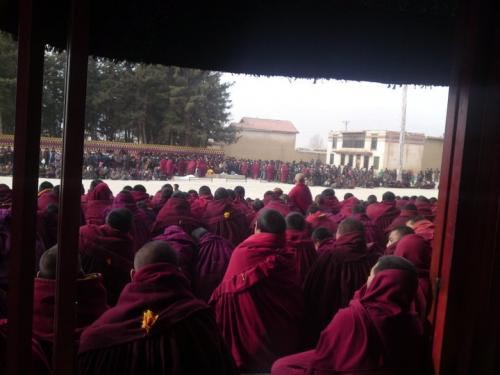
Prayer session in Kirti monastery. This photo was taken during the prayer session by both monks and lay people for Phuntsog in Kiri monastery on the morning of March 18, 2011. Phuntsog’s body is covered in yellow and people were offering khatags (white scarves) on his body and saying prayers.
According to exiled Kirti monks in contact with people in Ngaba, Tibetan students in Barkham (Chinese: Ma’erkang) county in Ngaba are still under lockdown at the school after they went on hunger strike on March 17 in sympathy with the self-immolation of Kirti monk Phuntsog and the situation of the Ngaba people. (ICT report, Crackdown continues at Kirti as Chinese authorities maintain pretence of ‘normality’).
After March 17, the students were confined to the school, had their mobile phones confiscated and internet access blocked. On or around April 22, the students’ textbooks and other reading materials were checked by government officials, and any books not endorsed by them were confiscated and burnt. According to the same Tibetan sources, publications that were burnt included copies of the magazine Shar Dungri (Eastern Snow Mountain), a collection of writings that was the first published Tibetan language commentary about the protests and crackdown from 2008 onwards, offering a critical perspective reflecting a prevailing sense of despair and loss, but also a way forward. The journal was quickly banned by Chinese government authorities, but not before copies had circulated in areas of Qinghai and Gansu provinces and beyond. The writers of Shar Dungri are from Ngaba, and it was funded by local businesspeople (ICT report on Shar Dungri writers and editors sentenced to prison: Three more Tibetan writers sentenced to prison and Like Gold that Fears no Fire: New Writing from Tibet).
According to the same sources, students were told that they were not allowed to possess any book without an official stamp of approval, and many students from Ngaba were told that they may not return to their homes for an indefinite period.
Deaths of two Tibetans in their sixties who tried to protect Kirti monks
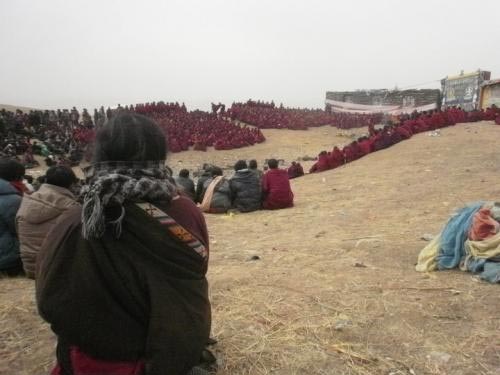
Prayer session at sky burial site. This photo was taken during the prayer session for Phuntsog at the sky burial site located over 3 kilomiters away from Kirti monastery in Ngaba county. People followed in procession with Phuntsog’s body from Kirti monastery to the sky burial site, chanting “Om Mani Padme Hum.” In this image we can see monks sitting in the upper area and lay people sitting below, praying for Phuntsog. Phuntsog’s body was cremated at the sky burial site on March 18, 2011. The flame is visible in the top right of the photo.
Further information has emerged about the death of 60-year old Dongko, one of two Tibetans in their sixties to die following beatings by paramilitary police as they attempted to protect monks at Kirti.
On the night of April 21, police raided the monastery and took away more than 300 monks, according to exile sources in contact with people in the area. The monks are still being detained. As the monks were being driven away in large trucks, the group of laypeople – mainly in their forties or older – who had been standing vigil at the monastery gate were beaten “mercilessly” by police according to the same sources. “People had their arms and legs broken, one old woman had her leg broken in three places, and cloth was stuffed in their mouths to stifle their screams,” said an exiled Kirti monk. The two people who died in their attempt to prevent the monks from being taken away were Dongko (male), aged 60, and 65-year old Sherkyi (female). (ICT report, Two elderly Tibetans killed as hundreds of monks detained from Kirti; crackdown deepens).
Dongko was a respected elder from a nomadic family, married to a Chinese woman, with a son and daughter. According to a Tibetan eyewitness who spoke to a monk now in India, Dongko became involved in protecting the Kirti monks from April 12 onwards, joining a group of local people gathering to hold vigil at the monastery after rumors spread that the police were going to take monks away. The same source said that Dongko stayed at the entrance to the monastery from April 12, “day and night” until paramilitary trucks massed at the monastery on April 21 and police began the process of taking away at least 300 monks. The monk in exile in south India said: “On April 21, more than a few hundred local people came and held hands together in a peaceful attempt to prevent the troops entering the monastery.”
Dongko and other Tibetans were beaten by police and the vigil was broken up. Dongko later fell unconscious and was carried home, where he died in the early hours of April 22. The Tibetan source, who has contacts in the area, said that Dongko had been injured two weeks previously, when the police set trained dogs on the crowd of Tibetans who had gathered to protect the monks. “At that time many were seriously hurt from beatings or being bitten by the dogs and it is believed that Dongko was severely injured in the leg, but he never stopped his struggle.” The exact cause of his death is not known but Tibetans in contact with others in the area believe that it may have been a heart attack brought on by beatings and his injuries.
Dongko was a well-liked and respected person in the area, described by those who knew him as a “very reliable” person who acted as the treasurer for his village association, elected by the villagers. The association provides both financial and practical assistance for families living there.
The same exiled monk said: “His family tried to invite some monks from Kirti monastery to do the traditional prayer offerings, but the Kirti monks were not allowed to go. So monks from some other Ngaba monasteries went to do this. The funeral took place on April 26. The family tried to carry Dongko’s body into Kirti – as families have done for prayers and blessings for generations – but were not allowed to do so by the paramilitary forces, who turned them back. Also the police did not allow many people to gather at the home to recite prayers for Dongko.”
Full details about the circumstances of 65-year old Sherkyi are not yet known due to the security clampdown in the area. She was also beaten seriously on April 21-22 as she attempted to prevent the monks from being taken away from the monastery. In an official statement released last week in English, (China.org.cn, China refutes reports on 2 Tibetans killed by police), the state media incorrectly asserted that reports by the international media citing ICT on the deaths of the two Tibetans were “fictitious”. The statement did appear to acknowledge the death of an older woman, saying that an “86-year-old female herder died of lung disease at her home in Aba Tibetan-Qiang Autonomous Prefecture.”
Crackdown intensifies at Kirti
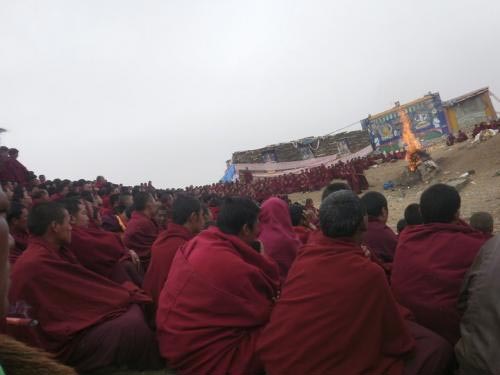
Monks praying for Phuntsog at sky burial site. Monks gathered for the cremation of Phuntsog’s body on March 18, 2011.
The armed police are using a residential compound within Kirti monastery, the largest and most important in the area, as a base for surveillance of all monks, and random searches are frequently carried out. Surveillance cameras have been installed throughout the monastery, including in monks’ cells.
Armed police are now wearing yellow jackets, while other troops have been concealed in trucks parked in the vicinity, rather than in the monastery compound itself. Just over two weeks ago, tents and temporary houses set up for paramilitary troops were dismantled, as if to give an impression of normalcy, but they have now been re-installed.
An exiled Kirti monk said that Tibetans he had spoken to described the situation as similar to coverage they had seen on television of war zones.
According to the same source, patriotic education campaigns are being conducted again at Kirti, with monks being compelled to denounce the Dalai Lama and the Tibetan government in exile as well as pro-Tibetan activist groups like the Tibetan Youth Congress.
Detentions and arrests in Ngaba
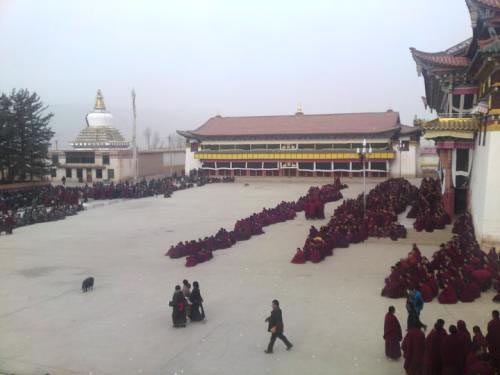
Prayer session at Kirti monastery. This photo was taken during the prayer session attended by both Kirti monks and local lay people who gathered in Kirti monastery. It is believed between 4,000 and 5,000 people (both monks and lay people) attended the prayer session on the morning of March 18, before Phuntsog’s body was carried to the sky burial site for cremation.
Around 20 of the 40 monks and laypeople from Ngaba detained since March 16 have now been released, according to exiled Kirti monks in touch with people in the area. About 25 still remain in detention, but have not yet been tried. There have been no details or information about the whereabouts of these 25.
Thirty-three year old Chogyam of the Chogyam Tsang house in the Chukle Gongma pastoral area of Ngaba disappeared on or around April 15, leaving behind his wife and one-year old child. It is believed he is being held in detention in Sichuan’s provincial capital of Chengdu. One of the exiled Kirti monks said: “There are many similar cases of disappeared people who have been missing for very long periods, apparently being held by State Security and Public Security, about whom no information whatsoever can be found as to their whereabouts or circumstances. When the Kirti monk author Go Sherab was detained, for example, nothing more was known about him until he was eventually released on May 5.” According to the same sources, Go Sherab has not been allowed to return to Ngaba.
On around May 2, 31-year old Kirti monk Losang Dargye of Me’uruma township was sentenced to three years in prison by the Ngaba county People’s Court. Losang Dargye became a monk at a young age, and in 2003 he travelled to Lhasa to begin higher Buddhist studies at Drepung monastery, which he completed with distinction. He is believed to have been among a group of Drepung monks who peacefully protested on March 10, 2008, and was detained for some months before being allowed to return to Ngaba. He was detained on April 11 this year in a raid by police and soldiers on his quarters in the monastery.
Kirti monk Konchok Tsultrim, age 33, from the rural area of Tawa Gongma was arrested after March 16. He was sentenced around the beginning of May to three years in prison by the Ngaba county People’s Court, and is now likely to serve his sentence outside Ngaba county. Konchok Tsultrim was serving as the monastery storekeeper. Details of the exact charges against him are not known.

